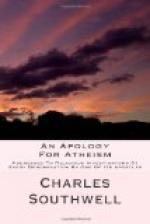the Reformed Poor Law, consider that twenty-one ounces
of food daily ’is more than the hard working
labourer with a family could accomplish for himself
by his own exertions.’ This, observes a
writer in the
Times, being the Commissioners’
reading of their own ‘standard,’ it may
be considered superfluous to refer to any other authority;
but, as the Royal Agricultural Society of England have
clubbed their general information on this subject in
a compilation from a selection of essays submitted
to them, we are bound to refer to such witnesses who
give the most precise information on the actual condition
of the
independent labourer, with minute instructions
for his general guidance, and the economical expenditure
of his income. ‘He should,’ they
say, ‘toil early and late’ to make himself
‘perfect’ in his calling. ’He
should
pinch and screw the family, even in the
commonest necessaries,’ until he gets
‘a week’s wages to the fore.’
He should drink in his work ‘water mixed with
some powdered ginger,’ which warms the stomach,
and is ‘extremely cheap.’ He should
remember that ’from three to four pounds of
potatoes are equal in point of nourishment to a pound
of the best wheaten bread, besides having the great
advantage of
filling the stomach. He is
told that ’a lot of bones may always be got
from the butchers for 2d., and they are never scraped
so clean as not to have some scraps of meat adhering
to them.’ He is instructed to boil these
two penny worth of bones, for the first day’s
family dinner, until the liquor ‘tastes
something
like broth.’ For the second day, the bones
are to be again boiled in the same manner, but for
a longer time. Nor is this all, they say,
’that the bones, if again boiled for a
still
longer time, will
once more yield a nourishing
broth, which may be made into pea soup.’
This is the system and this the schoolmastership expressly
sanctioned by the Bishops of London and Chester.
In piety nevertheless these prelates are not found
wanting. They may starve the bodies but no one
can charge them with neglecting the souls of our ‘independent
labourers.’ Nothing can exceed their anxiety
to feed and clothe the spiritually destitute.
They raise their mitred fronts, even in palaces, to
proclaim and lament over the spiritual destitution
which so extensively prevails—but they
seldom condescend to notice physical destitution.
When the cry of famine rings throughout the land they
coolly recommend rapid church extension, thus literally
offering stone to those who ask them for bread.
To get the substantial and give the spiritual is their
practical Christianity. To spiritualise the poor
into contentment with the ‘nourishing broth’
from thrice boiled bones, and to die of hunger rather
than demand relief, are their darling objects.
Verily, if these and men like these do not grind the
faces of the poor, the Author of this Apology is unable
to conceive in what that peculiar process consists.




